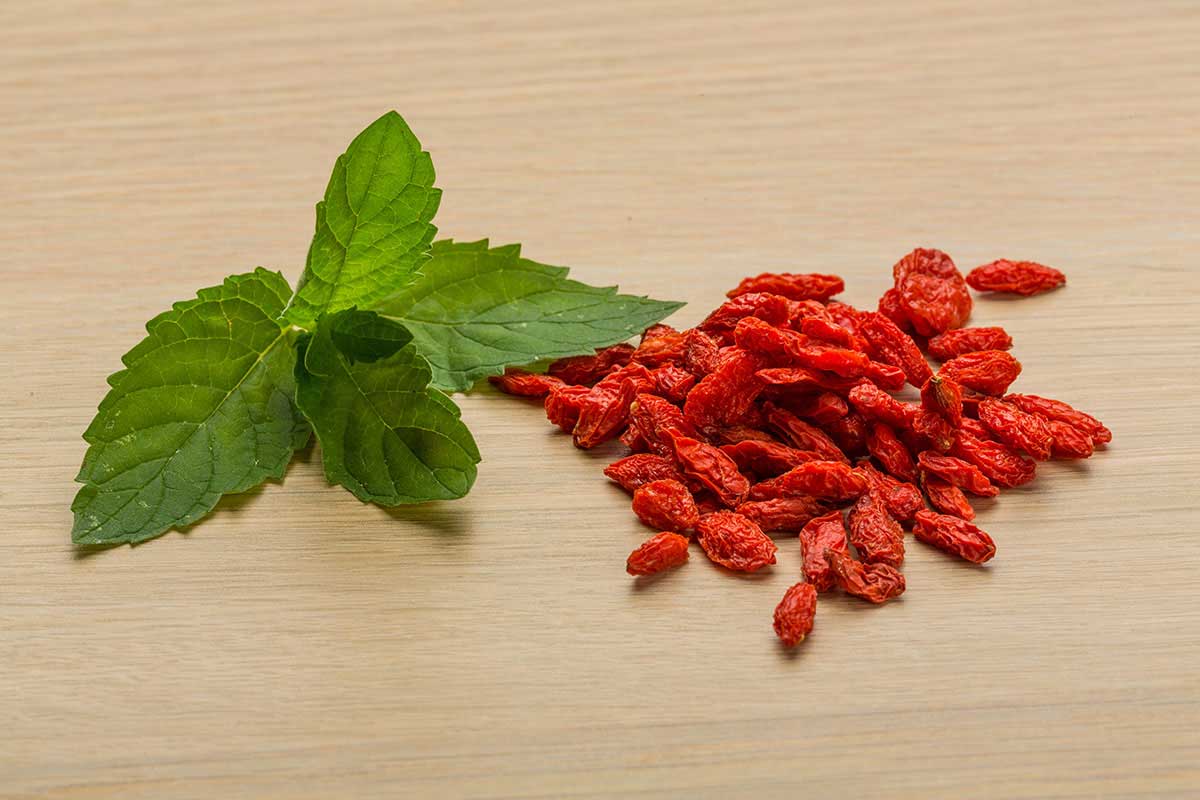Berberine is an alkaloid compound that has been used for over a thousand years as part of traditional Chinese medicine for its positive effects on lowering blood sugar, weight loss, and improved heart health (1, 2).
It can also reduce total cholesterol and LDL-cholesterol, helping prevent a range of cardiovascular problems. Berberine is also effective when used to treat type 2 diabetes. It helps regulate insulin in the body, lowering elevated blood sugar. It can also break down sugar, preventing excess blood sugar levels (3).
Top Berberine
1. Nuzena Berberine Pure+
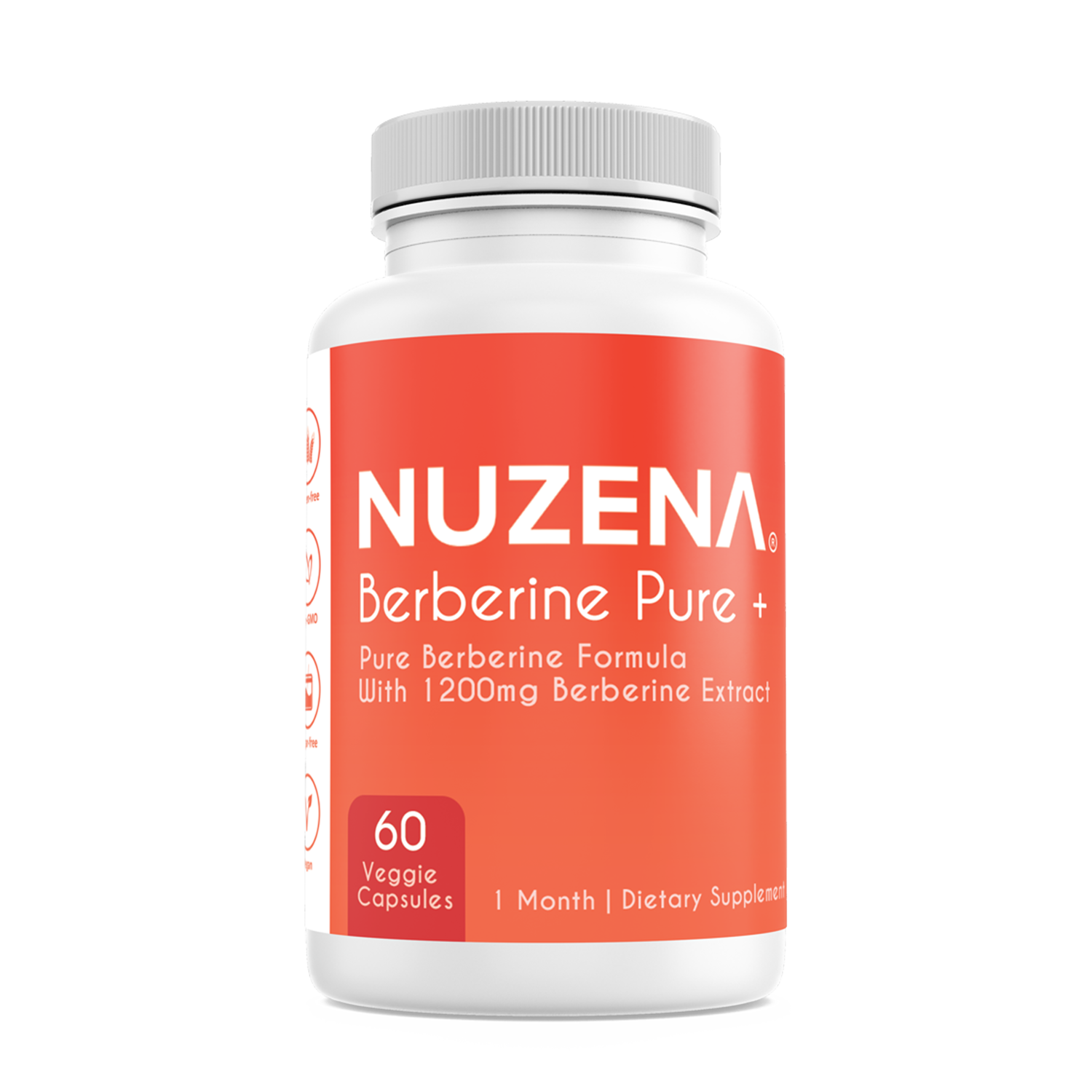
Looking at the formula, Berberine Pure + has the highest dosage in a berberine supplement on this list with 1200mg. With potency aside we also find this supplement trumps others in terms ingredient quality. Something we find impressive here at Healthtrends is the formula being non-GMO, gluten free and vegan friendly.
The berberine used in their formula comes with extensive scientific research, and the American Diabetes Association also supports its health benefits. Their research has shown berberine to improve heart health, lower blood sugar, and quite possibly aid you in losing weight. It’s no surprise Berberine Pure + by Nuzena takes our vote for the top supplement of its category.
2. Thorne Research Berberine

Thorne’s Berberine capsules have outstanding reviews, including consumers who noticed improvements in digestion as well as PCOS symptoms. They come in both a capsule Berberine option and a Berbercap option, both of which provide similar benefits to help maintain both your blood sugar levels as well as your cholesterol levels.
This formula contains 85% Berberis Concentrate Berberine HCI from Barberry extracts. Thorne’s Berberine product does not contain dairy, soy, corn, yeast, sugar, or magnesium stearate.
3. Amazing Formulas Berberine

Amazing Nutrition Berberine comes in 500mg capsules that are easy to swallow and every single serving provides you with an optimum dosage to keep supplementation simple. Because their berberine capsules are free of shellfish, eggs, fish, peanuts, milk, wheat, soy and tree nuts, they are an optimal choice for people with dietary sensitivities or diet preferences.
Amazing Nutrition Berberine features berberine hydrochloride, a form that has been widely studied and may be absorbed more easily by the body. Amazing Berberine is manufactured in accordance with Good Manufacturing Practices (GMP), and is 3rd party tested.
4. aSquared Nutrition Berberine

aSquared Nutrition Berberine comes in vegetarian and vegan friendly capsules, providing a hefty 1000mg of berberine HCL per serving. Berberine has a rich and complex history in herbal medicine, and can support cardiovascular health and overall wellness.
Their formula is extensively tested and formulated to ensure potency and is made in an FDA & GMP registered facility located in the USA. There are no unnecessary fillers, binders, or potentially harmful preservatives and is GMO-free, ensuring quality.
5. Sunergetic Berberine Supplement

Sunergetic Berbine provides one of the highest dosages of Berberine per serving on the market at 1200mg total. The additional ingredients to formulate the capsule are vegan and vegetarian friendly and do not present anything of concern. In addition, their berberine supplement is free of gluten, corn, salt, soy, yeast, preservatives, dairy and shellfish.
Sunergetic Berberine is manufactured in an FDA registered facility that adheres to Good Manufacturing Practices (GMP).
6. Toniiq Ultra-High Strength Berberine

Toniiq’s Berberine formula comes in a 500 mg per capsule dose that delivers results in a 97% purity rated formula that is 82% concentrated extract. Higher purity means a greater bioavailability of the active compounds that give berberine its powerful ability to help the body maintain healthy blood sugar metabolism
This Berberine comes from Berberis Aristata straight from the wilds of the Himalayas. Toniiq products are produced in a GMP-certified and NSF-approved state-of-the-art manufacturing facility in the USA. Our products are vegan-friendly, have no additional preservatives, and are free of wheat and gluten.
7. Nutrivein Premium Berberine HCL
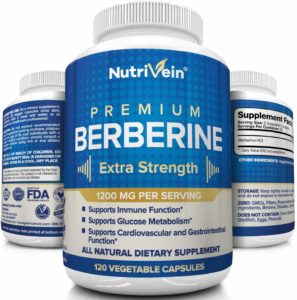
Nutrivein berberine features berberine hydrochloride, a form that has been widely studied and may be absorbed more easily by the body. It also comes in a very high 1200mg per serving dosage. Their size 00 capsules are vegan/vegetarian friendly and soft easy-to-swallow.
Nutrivein makes their Berberine supplement in a facility that is both GMP and FDA registered, located in the USA. This formula is third-party tested to ensure quality and reliability.
8. Horbaach Berberine Supplement
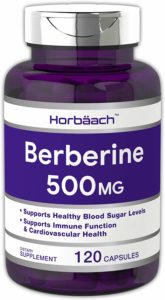
Horbaach’s Berberine supplement comes in 500 mg doses per capsule. Horbaach uses highly potent plants filled with Berberine to extract the supplement for this formula.
This product lists extensive feedback specifically related to reduced cholesterol and blood sugar levels as well as PCOS and weight loss support. This formula is made in a GMP-approved facility located in the USA and undergoes 3rd-party lab testing prior to distribution.
9. Plantvital Berberine High-Potency Supplement
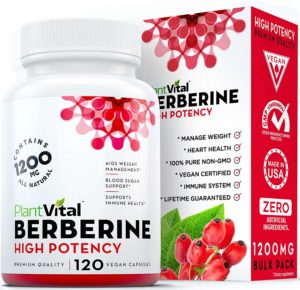
Plantvital Berberine is highly potent 1200mg per serving berberine supplement to deliver maximum results and efficiency. PlantVital High Potency Vegan Berberine 1200mg supplement enhances your immune system by balancing alkalinity. This aids a healthier digestive and gastrointestinal environment, also less bloating and effective weight management.
Plantvital adds absolutely no artificial ingredients to their capsules. Their formula is made in the USA in a GMP-approved facility and is also 3rd-party lab tested for ultimate purity.
10. We Like Vitamins Berberine Supplement

We Like Vitamins stands true to their title with this 1200 mg Berberine supplement that is made from high-quality extract. This Berberine supplement contains no GMO’s, artificial colors & flavors, lactose, gluten, or sugar.
It comes in a vegan-friendly capsule that is made in the USA with an FDA and GMP-registered facility located in the USA.
11. EzyAbsorb Berberine Supplement

EzyAbsorb Berberine supplement is dosed in 500 mg capsules. This formula contains 85% pure extract from Barberry root.
This formula is made in an FDA and GMP-registered facility in the USA and is also 3rd party lab tested to ensure quality.
How We Rank
The first thing we looked at was purity. According to research, berberine has only been studied by itself. As such, no products with anything other than berberine was included on the list. One well-known supplement we reduced from our ranks was Simply Nature’s Pure because of the cinnamon additives. Another that met the same fate was Best Naturals for vitamin C and zinc additives as fillers.
Next, we looked at the sourcing of berberine. The recommended Berberine source for the purest form is harvested directly from Barberry or Berberis Aristata. It can also be extracted from plants or herbs like Goldenseal, Oregon Grape, or Goldthread. We preferred for the Berberine to be extracted from the first 2 sources, like Toniiq Ultra-High Strength Berberine and Sunergistic Berberine. Popular companies like Douglas Labs Berberine, did not make the list because they didn’t fit this criteria.
Third, we looked at dosages. According to research, berberine is has been studied to be effective between 1000-1500mg doses. As such, we reward companies like Nutrivein Premium Berberine HCL and Plantvital who fell in the middle and provided a healthy 1200mg/serving.
Finally, we reviewed product information for whether or not the supplement was third-party tested before being packaged and distributed. Third-party lab testing ensures that the company truly cares about the quality and reliability of their product and this was an essential trait for our top 10 rankings. Companies like Nuzena and Thorne ranked the best because of this.
Benefits
1. Berberine can help lower blood sugar levels. Research has indicated that berberine may be an effective natural treatment for type 2 diabetes (4).
Type 2 diabetes is a medical condition where the body cannot properly regulate blood sugar levels. Insulin is less effective, so sugar is not broken down. High blood sugar levels can cause severe organ damage, increasing the risk of heart disease and kidney failure. Diabetes can also cause damage to vision. Supplementation with berberine led to a significant reduction in blood sugar levels in people with type 2 diabetes (5).
It appears to work in many different ways. It helps increase the body’s response to insulin, which is the hormone responsible for regulating blood sugar levels. Berberine also appears to speed up glycolysis, the process where the body breaks down sugars.
2. Berberine can help with weight loss. Many of the properties that make berberine effective for type 2 diabetes are also useful for losing weight. Studies have shown the berberine can cause weight loss and a reduction in total body fat with few notable side effects. Obese people were given 300 mg of berberine three times a day. They showed significant changes in body mass index after just three months. Most patients moved from being obese to being overweight (6).
It’s believed that berberine helps regulate molecules that control fat production and fat burning in the body, such as insulin. It may also prevent the growth of fat cells and regulate the metabolism of sugar. The insulin regulating properties of berberine mean that it may be able to help keep weight off once it’s lost.
Berberine also has significantly fewer side effects than other treatments for weight loss, including bariatric surgery.
3. Berberine can help fight depression. Berberine may also be a useful treatment in some cases of depression. It also has fewer side effects than standard antidepressants, making it a less risky natural alternative to traditional pharmaceuticals. Research conducted on rats has shown that berberine is a natural antidepressant, increasing activity levels, and decreasing fatigue (7).
The exact role of berberine in depression is still largely unknown. Early research indicates that berberine can reduce inflammation in the brain. There are studies linking brain inflammation to depression, so this may be why berberine is sometimes effective for treating the condition.
As these studies were conducted in rats, more research is needed to understand the effects of berberine on depressed humans.
4. Berberine may be able to reduce the likelihood of heart failure. Heart failure can lead to sudden death, as the body no longer receives a sufficient amount of blood. Berberine may be effective for some patients with heart failure, helping prevent sudden death. Patients who were given berberine had greater exercise capacity, less fatigue, and a lower frequency of sudden cardiac events. This research indicates that berberine can significantly improve the quality of life in people with heart failure (8).
5. Berberine can help to reduce cholesterol levels. Berberine has long been used to reduce cholesterol and improve circulatory health. Studies have confirmed the role that berberine plays in regulating cholesterol levels. Berberine acts by lowering levels of total cholesterol, as well as LDL, which is the “bad” form of cholesterol (9).
Lower cholesterol can reduce the risk of developing heart disease and other cardiovascular diseases. Berberine also helps regulate blood sugar levels and prevent type 2 diabetes, which can significantly increase the risk of getting heart disease. For people with high cholesterol and diabetes, berberine acts through multiple different mechanisms to protect the heart.
6. Berberine may help slow the progression of cancer cells. Berberine may also be a useful supplement for slowing the growth of certain cancers (10).
Studies have shown that it has anti-tumor properties and that it can prevent some types of cancer cells from spreading. Note that berberine has not been shown to be effective as a primary treatment for any form of cancer. It should never be used as a first-line treatment, but should only be combined with other medication. If you are considering using berberine as a supplementary treatment for cancer, speak to your doctor.
7. Berberine may have neuroprotective effects. Dementia and other neurological diseases are widespread, burdening millions of people and significantly lowering quality of life in older age. Berberine may be able to help prevent certain types of dementia and neurodegenerative diseases (11).
Studies indicate that berberine has neuroprotective effects, helping keep brain cells healthy. It seems to promote neuroprotective factors, as well as prevent neurodegeneration (12)
This research is still early, and berberine likely isn’t effective for treating any neurological illnesses. However, it may be useful when used as a preventative agent.
8. Berberine can help treat small intestine bacterial overgrowth (SIBO). Small intestine bacterial overgrowth (SIBO) is a condition where excess bacteria are found in the digestive tract. This can disturb regular digestion, and lead to diarrhea, as well as other gastrointestinal symptoms. The standard treatment for SIBO is an oral course of antibiotics. However, antibiotics often have additional gastrointestinal side effects, and they can disrupt the healthy bacteria in the gut. Berberine is an effective natural alternative to antibiotics when used to treat SIBO.
Patients with SIBO were given either antibiotics or an herbal treatment containing berberine. The patients who were given the herbal treatment recovered just as quickly as those who were given antibiotics (13).
9. Berberine can help reduce lung inflammation. Smoking can cause inflammation in the lungs, leading to coughing, difficulty breathing, and fatigue. Berberine has natural anti-inflammatory properties and may help prevent damage to the lungs from smoke. Mice that were given berberine before exposure to cigarette smoke showed significantly lower levels of lung injury and inflammation. (14).
More research is needed to understand if these effects are also seen in humans.
10. Berberine may be able to prevent kidney damage. Diabetes can damage the kidneys, and potentially lead to renal failure. Berberine, in addition to helping regulate blood sugar levels, may also directly protect the kidneys. Studies in rats indicate that berberine helps prevent kidney damage due to insulin sensitivity. Rats were given a diet designed to harm their kidneys, as well as high doses of berberine. Researchers found that the rats given berberine had much healthier kidneys (15).
11. Berberine can help the body fight off infections. Berberine has natural antimicrobial properties, killing certain types of bacteria. This may make it an effective way of treating some infections. It has also been shown to fight fungal growth, which could make it effective for slowing the spread of fungal skin conditions (16).
Although berberine may have antimicrobial properties, it should not be used as a replacement for antibiotics.
12. Berberine helps to prevent fat deposits on the liver. Liver function can be impacted when excess fat is deposited. Berberine has been shown to help the body regulate blood sugar and fat formation, and may be able to prevent fat deposits on the liver. Berberine has been shown to reduce the amount of fat deposited on the liver, improving function, and helping to prevent non-alcoholic fatty liver disease (17).
13. Berberine can help reduce the severity of diarrhea. Berberine has natural antibacterial properties and is also anti-inflammatory. These properties make it useful for treating certain cases of diarrhea (18)
It can kill bacteria that cause gastrointestinal distress, as well as reduce inflammation throughout the digestive tract.
Berberine should not be used as a replacement for antibiotics in cases of severe bacterial infections of the digestive tract. However, it’s a safe and effective alternative to antibiotics when used for milder infections or cases of gastrointestinal discomfort.
14. Berberine may help heal canker sores. A 2013 randomized, double-blind, placebo-controlled, clinical trial showed that a gel containing 5mg/g Berberine applied daily for 6 days was able to reduce the size and pain associated with canker sores (19).
Side Effects
1. Berberine can interact with other medications. This may result in unexpected complications if you have certain medical conditions. If you are taking medication that lowers blood sugar levels, you should consult with your doctor before taking berberine. Research has shown that berberine can regulate blood sugar levels. However, if you are already on medicine that drops blood sugar levels, berberine could cause a further decrease, pushing blood sugar to a dangerously low level.
2. Berberine can cause IBS like symptoms. Some users also report that routine use of berberine can cause a range of digestive side effects, including cramps, upset stomach, constipation, and diarrhea. These symptoms are usually minor and often pass once the body adjusts to the supplement (20).
3. The long term effects of berberine are unknown. There is little research on the long term effects of berberine, with most studies lasting no longer than 12 months. Although berberine is likely safe when taken for prolonged periods, more studies are needed to understand its long term effects on the body.
4. Women who are pregnant or breastfeeding should consult their doctor before using berberine. There is little research on the safety of the supplement in pregnant women, so take extra caution. Children should also avoid berberine unless instructed to take it by a doctor.
5. Berberine is not recommended to be used for children, particularly newborns. The primary reason for this is that Berberine can negatively react with bilirubin levels, particularly in a child t risk for jaundice. Berberine can potentially cause the liver to produce bilirubin at reduced rates leading to an increased risk of jaundice but also leading to the possibility of brain damage on rare occasions as well in cases where severe jaundice is present.
6. Berberine requires taking with caution if you are have been diagnosed with diabetes or low blood pressure. Berberine works to reduce blood sugar levels, which means a diabetic individual should consult with their doctor but also should be mindful of monitoring their blood sugar levels in case their bodies were to react badly to low blood sugar levels.
Additionally, individuals who suffer from low blood pressure should be cautious when taking Berberine and should also take low doses, if any at all. Berberine can naturally lower blood pressure and therefore could cause blood pressure levels to reduce too much for appropriate health results.
Recommended Dosage
Berberine does not have a standard recommended dose, with amounts varying widely depending on the specific medical condition it’s used for. You should check the strength of the berberine you buy, as it can vary widely by the producer.
People taking berberine for weight loss saw significant results when supplementing with 300 mg three times a day.
Studies, where berberine was used to treat high blood pressure, used a dose of 1500 mg, split into three doses of 500 mg taken throughout the day.
Other studies that have used berberine to regulate blood sugar levels used a dose of around 1000 mg, split into two or three doses.
Most studies with berberine have used a dose of around 500 to 2000 mg, although there has been some research using higher doses without any major side effects.
Higher doses of berberine show few side effects and are likely safe. However, there may be some gastrointestinal discomfort when supplementing with high doses. To minimize side effects, start with a low amount, and slowly work your way up to the target dose. Taking berberine with food may also reduce the risk of stomach pain or digestive issues.
FAQ
Is berberine safe? Yes, studies using berberine to treat a wide range of medical conditions found few side effects associated with the use of the supplement. The side effects that are seen with berberine tend to be minor and include stomach discomfort, cramps, diarrhea, and constipation. Many of these side effects go away as the body gets used to berberine.
Can you take berberine with other medications? In most cases, yes. Berberine does not interact strongly with most medications. However, if you are taking medication that lowers blood sugar, you should speak to your doctor before using berberine. It can also reduce blood sugar levels, which can be dangerous in combination with medication that also affects blood sugar.
Can berberine be taken long term? Berberine shows few side effects when taken for up to 12 months. However, there is little research on the long term effects of berberine. It’s likely safe, but more research is needed to understand what berberine does to the body when taken for prolonged periods. If you plan on taking berberine long term for a specific medical condition, you should speak to your doctor first. It could interact with some other medications, which could have more serious complications when taken for prolonged periods.
What time of day should you take berberine? Berberine is broken down quickly by the body. That means that you’ll have to take it throughout the day to ensure that it’s always in your system. Take berberine in the morning, preferably with food. You should then take another dose around midday or in the afternoon, and then a third dose in the evening. Most berberine supplements come as capsules, but you can also find powder formulations.
When will you start seeing effects from berberine? It can take a while for berberine to have an impact on the body. Some patients using berberine to reduce cholesterol saw effects within a few weeks, but it took months for it to have a substantial impact. For weight loss, berberine showed significant results in around 3 months. If you are using berberine to regulate blood sugar levels, you will likely see positive short-term results, but it can take weeks for it to reach its maximum efficacy.
Can berberine be used alongside statins, such as metformin? Yes, berberine can indeed be used alongside statins like metformin. Studies have used berberine with statins without any noticeable side effects. Berberine may actually increase the effectiveness of many statins, working together to reduce high blood pressure. If you are planning on using berberine with statins, you should still speak to your doctor, as it may affect their treatment plan.
How is berberine taken? Berberine is a compound found in a number of plants and is extracted to produce more potent supplements. In most cases, berberine is taken orally, usually as a powder in a capsule.
Is berberine useful for treating arthritis? There is no research that shows berberine is effective for arthritis. Some studies have shown that berberine has anti-inflammatory properties. Since arthritis is caused by increased inflammation, many people have wondered if berberine would be useful for treating arthritis.
Does berberine kill good bacteria? Early but promising evidence suggests that berberine can boost intestinal health by balancing out your microbiome, the collective bacteria living in your gut.
Is berberine good for the liver? Berberine also has an improvement effect on NAFLD patients’ insulin resistance and fatty liver condition. However, more long term studies are needed.
Is berberine better than metformin? Both berberine and metformin increase the cellular uptake of energy compounds and break down energy storage. Berberine has been shown to decrease total cholesterol and LDL cholesterol, while metformin has been shown to decrease fatty acids, triglyceride, and LDL cholesterol.
Can berberine be taken with probiotics? Probiotic supplements contain bacteria that are thought to be beneficial to health. Berberine might kill certain probiotic strains. If taken together, berberine might reduce how well probiotic supplements work.
How much berberine should I take? The standard dose of berberine is 900-2,000mg a day, divided into three to four doses. Berberine should be taken with a meal, or shortly after, to take advantage of the blood glucose and lipid spike associated with eating.
Is berberine the same as barberry? Barberry and goldenseal (Hydrastis canadensis) are often used for similar medicinal purposes because both herbs contain the chemical berberine. Berberine has been shown to inhibit the growth of bacteria in test tubes and may help the immune system function better.
What plants contain berberine? Berberine is a quaternary ammonium salt from the protoberberine group of benzylisoquinoline alkaloids. It is found in plants such as Berberis, Mahonia aquifolium, Hydrastis canadensis, Xanthorhiza simplicissima, Phellodendron amurense, Coptis chinensis, Tinospora cordifolia, Argemone mexicana, and Eschscholzia californica. Berberine is usually found in the roots, rhizomes, stems, and bark.
Is berberine used as a dye? Due to berberine’s strong yellow color, Berberis species were used to dye wool, leather, and wood. Wool is still dyed with berberine today in northern India. As a natural dye, berberine has a color index of 75160.
When is the first recorded use of berberine? Berberine was supposedly used in China as folk medicine by Shennong around 3000 BC. This first recorded use of berberine is described in the ancient Chinese medical book The Divine Farmer’s Herb-Root Classic.
Should you take multiple doses or berberine per day or just one big one? Berberine has a half-life of several hours, so it is necessary to spread your dosage to several times per day to achieve stable blood levels.
Can berberine lower my cholesterol? Various studies show encouraging results for berberine in regards to lowering cholesterol. Unfortunately, a lot of the research is done on animals. More research is needed to determine if it will be effective in humans.
What is berberine? Berberine is a bioactive compound that can be extracted from several different plants, including a group of shrubs called Berberis. It has a long history of use in traditional Chinese medicine and modern science has confirmed its benefits.
Is berberine as powerful as a pharmaceutical drug? Yes, berberine has been shown to be as powerful as pharmaceutical grade blood sugar management drugs.
Can berberine help with weight management? Berberine can help with weight management, with studies showing significant drops in total body fat after 3 months of daily berberine use. Berberine also reduces blood sugar levels, so it should not be used with other medications that lower blood sugar. Although berberine is generally considered safe, there are a few commonly reported minor side effects. However, the long term effects (more than 12 months) of berberine consumption are yet to be studied.
Is berberine as effective as drugs? It’s one of the only supplements that can be as effective as pharmaceutical drugs. Modern berberine is extracted from various plants, including goldenseal, European barberry, and tree turmeric. Current research has confirmed many of the traditional uses of berberine are relevant today. Studies have shown that berberine is an effective treatment for high blood pressure.
Recap
Berberine is an herbal supplement that has been shown to be effective for treating a wide range of medical conditions, including type 2 diabetes, high cholesterol, and SIBO. It has few side effects and is generally safe when used with other medications. Studies have shown that berberine is effective for lowering both total cholesterol and LDL, helping to improve cardiovascular health and prevent heart disease. It can also help regulate blood sugar levels and help treat type 2 diabetes, as well as lower high blood pressure (21).
Additionally, berberine may have neuroprotective effects. Studies show that it boosts neuroprotective factors, helping prevent dementia and movement disorders, such as Parkinson’s disease (22).
Berberine is safe, with few major side effects or severe interactions with medication. It can cause mild stomach discomfort, as well as constipation, diarrhea, and cramps. If you are taking medication that reduces blood sugar, speak with your doctor before using berberine, as it could drop blood sugar levels below healthy levels.
For Healthtrends #1 recommended berberine supplement, click here.
